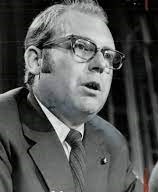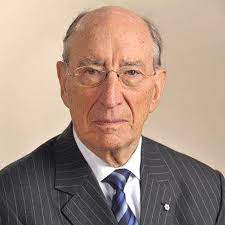Hemingway defined courage as grace under pressure and JFK famously quoted him. Marc Lalonde showed that kind of political courage in a crisis when Pierre Trudeau’s cabinet, and indeed Canada’s survival as a nation, were under great pressure. With Lalonde’s recent passing, I think it is important to remember the crisis and Lalonde’s role in it.
I’m referring to the wildcat strike by English-speaking air traffic controllers and pilots against the introduction of bilingual air traffic control in Quebec by Pierre Trudeau’s Government. The timing couldn’t have been worse for the government or, conversely, better for the pilots and controllers, who closed Canadian airspace the last week of June 1976 – just two weeks before the the 1976 Montreal Olympics. I chronicled this crisis in my 1983 book The Language of the Skies: The Bilingual Air Traffic Control Conflict in Canada. As part of the research for the book, I interviewed Lalonde in summer 1979, shortly after Joe Clark’s Progressive Conservative Government had taken office.

Otto Lang’s Agreement
Trudeau’s Minister of Transport, Saskatchewan MP Otto Lang, was responsible for negotiating an agreement that would induce the pilots and controllers to return to work. By the last weekend in June, Lang had worked out the outlines of a deal that would include a commission of inquiry to address the concerns about aviation safety raised by the pilots and controllers and a commitment by the Government that it would introduce bilingual air traffic control (that is, controllers communicating with pilots in either English or French, as requested by the pilot, rather than the status quo in which only English was used) only if the commission was unanimous in finding that it was safe and if approved by Parliament.

Lang brought his strategy to an emergency cabinet meeting held at the Prime Minister’s residence on Saturday June 26, and received approval for his approach.
Prime Minister Trudeau had another matter to deal with. Immediately after the cabinet meeting, he left for the first G7 Summit, hosted by President Ford in Puerto Rico. Trudeau had lobbied hard to expand the G6 to include Canada, and he gained the support of President Ford and Chancellor Schmidt. He needed to be there.
Otto Lang’s offer that weekend went considerably beyond the pilots’ and controllers’ bottom line. (I know that because I interviewed their leaders as well.) Lang offered a formal written agreement though the pilots and controllers were only looking for a commitment in a speech to the House of Commons. In the agreement, the pilots and controllers would be consulted about the choice of the commission of inquiry’s third judge, the commission’s decision criterion would be “beyond a reasonable doubt,” and its conclusions would be put to a free vote (unconstrained by party discipline) in the House of Commons. Lang and the leaders of the pilots’ and controllers’ associations completed the agreement Sunday night and would sign it Monday morning and airline operations would resume that day.
A Total Victory on Paper
Lang had discretion to negotiate an agreement, but when ministers, especially those from Quebec, became aware of it, they didn’t at all like what he had agreed to. Marc Lalonde, who was both Minister of National Health and Welfare and leader of the Quebec caucus, called Lang on Monday morning and urged him to delay the press conference announcing the agreement until Trudeau, who was still in Puerto Rico, had been consulted, but Lang would not.
Lalonde, who had been Trudeau’s chief of staff before entering politics, called Trudeau anyway. Neither one liked the terms of the deal, but they realized they would have to live with it. Had they undercut Lang, he likely would have resigned, and aviation chaos would have continued.

Interviewed on the plane back from Puerto Rico, Trudeau ambiguously called the agreement “as total a victory on paper as was needed.” When asked whose victory he was referring to, Trudeau didn’t take the bait, pronouncing the agreement “not a victory of the government over anyone else but a victory of Canada in reaching a settlement.”
Several federal ministers from Quebec joined the widespread francophone condemnation of the agreement. It was seen as blatantly contradicting the Trudeau Government’s policy of providing services, and allowing people to work, in either French or English in Quebec. Jeanne Sauve, the Minister of Communications (whom Trudeau would name as Governor-General in 1984), said in an interview, “it certainly is a painful thing when any government has to kneel down to a bunch of fanatics.” Environment Minister Jean Marchand, who had entered politics with Trudeau in 1965, resigned from Cabinet in protest.
Lalonde’s Political Courage
Marc Lalonde’s feelings about the agreement were similar to those of his colleagues, but his reaction was different, and the reaction is a measure of his political courage. The day after the agreement was released, he gave a press conference in Quebec City and did interviews on Radio-Canada and TVA strongly supporting it. He argued that the Government would do everything possible to convince the Commission of Inquiry that bilingual air traffic control was safe, and that Quebecois outraged by the agreement could do something constructive by providing financial support for the nascent organizations of French-speaking pilots and air traffic controllers. His message to his fellow Quebecois was that their cause wasn’t lost, that the agreement was a tactical retreat but not a surrender, and that they should continue the struggle for the dignity and recognition of the French language in Canada.
The Agreement in Retrospect
Pierre Trudeau, Marc Lalonde, and Otto Lang were all law professors (and Lang a Dean of Law) before entering politics. My guess is that they all read the agreement carefully and concluded that the conditions it imposed for the commission of inquiry did not make it impossible for the Government to prove that bilingual air traffic control could be implemented safely. Put differently, the Government had a way forward. However, the issue had been so politicized by then that it was obvious that, if the three judges on the commission of inquiry didn’t agree unanimously beyond a reasonable doubt that aviation safety hadn’t been compromised by bilingual air traffic control, then it wouldn’t be accepted by the public.
Almost fifty years ago, both politicians and aviation professionals were willing to put a dispute about a technical issue before a panel of judges and, in advance, commit to accepting their evaluation of the evidence that would be brought forward. As I chronicled in my book, the judges designed a process all parties felt was fair and reached a conclusion – that bilingual air traffic control could be implemented without any reduction in aviation safety – that all parties accepted.
Now, many Canadians, like people in other countries, are unwilling to recognize the expertise of professionals, such as epidemiologists, immunologists, computer scientists or economists, or the good faith of judges. One can ask whether – in policy disputes involving expertise and the unbiasedness of decision-makers – Marc Lalonde’s courage would be sufficient to achieve a comparable outcome.

Leave a Reply